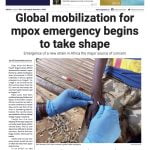The coronavirus disrupted economies and societies across the world Monday, resulting in global markets plunging and oil prices crashing, triggering concerns of a worldwide recession.
The death toll neared 4,000, with more than 110,000 infections in over 100 countries since the virus emerged in December in Wuhan, China. It has disrupted global travel, and cancelled conferences and sporting events.
Experts fear that the epidemic will spread further and will lead to recession, as tens of millions of people across the world are in quarantine. Global stock markets marked their biggest falls since the 2008 financial crisis.
Analysts dubbed 9 March “Black Monday”, after oil prices fell as much as 30%, as Saudi Arabia and Russia prepared for a global price war. They added that the combination of sharply declining oil prices combined with fears over the economic impact of the coronavirus sparked a worldwide panic that heightened uncertainty.
Stock markets fell across Europe with losses in France, Germany and Spain of about 8%. In Italy stocks collapsed by more than 11% as the whole country entered lockdown. French president Emmanuel Macron called for EU leaders to hold a videoconference today, aiming to coordinate the response to the outbreak in Europe.
Major US indices plunged more than 7%, with the Dow finishing more than 2,000 points lower in its worst session since 2008. Stock markets also plunged around Asia on Monday, where by mid-morning, the benchmark Nikkei 225 index had dropped 5.10%, and the broader Topix index was off 5.01%.
The IMF called on governments to roll out aggressive financial supports for the coronavirus-infected global economy, including direct payments to workers and businesses. The ECB is expected to provide further help for Italy and other economies in Europe by cutting interests deeper into negative territory, extending more long-term loans to banks and increasing its purchases of assets such as corporate bonds.
Analysts warned that, as countries retreat into protectionist policymaking, the lack of a coordinated global response could threaten to unsettle global markets further. Today, markets saw a slow recovery, which, according to experts, is helped by optimism over a slowdown of the spread of the virus in China.
Global markets plunge amid oil price war and coronavirus fears
EPA/ARNE DEDERT
A Deutsche Bank logo in front of a board with the German stock index DAX graph on the floor of the stock exchange in Frankfurt am Main, Germany, 16 September 2016. The threat of a multi-billion dollar fine for Deutsche Bank in the USA dampens the mood in the German stock market. Stocks from the bank dropped more than 8 percent.
- Advertisement -
- Advertisement -






